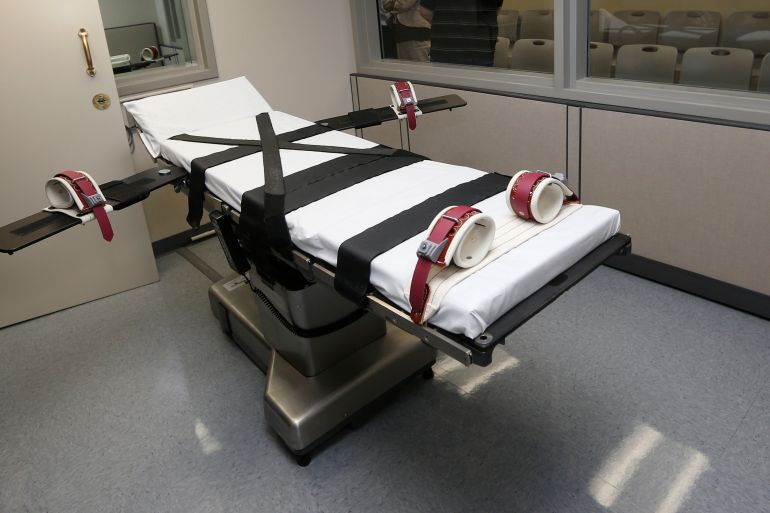US ‘botched’ executions reach all-time high, report finds
Seven of 20 attempted executions in 2022 were ‘visibly problematic’, research group says, but practice is in decline.

Los Angeles, California – While the use of the death penalty continues to decline in the United States, a new report has found that “botched” executions reached a new high this year.
In its annual report on the use of capital punishment in the country, the Death Penalty Information Center (DPIC) said on Friday that seven of the 20 attempted executions by US states in 2022 were “visibly problematic”.
Keep reading
list of 3 itemsExecutions surge 20 percent in 2021 led by China, Iran: Amnesty
Equatorial Guinea abolishes the death penalty
That included a case in which Alabama officials struggled to insert an intravenous (IV) line into a man for three hours, said the report, which defined a “botched” execution as one that includes “executioner incompetence, failures to follow protocols, or defects in the protocols themselves”.
“As lethal injection turns 40 years old this year, 2022 can be called ‘the year of the botched execution,'” the DPIC, a non-profit research group based in Washington, DC, said in a statement accompanying its findings, calling the proportion of problematic execution attempts “astonishing”.
Capital punishment – which refers to the sentencing of convicted offenders to death – continues to receive support in the US, with about 55 percent of people approving of its use against convicted murderers, according to a Gallup poll released last month.
A total of 18 people were executed across the country this year, in six states alone: Alabama, Arizona, Oklahoma, Mississippi, Missouri and Texas. However, that is far lower than in previous years before the COVID-19 pandemic, as the practice has come under growing scrutiny.
‘National reconsideration’
Proponents of the death penalty say it is morally justified when someone has been found guilty of a heinous crime.
But experts say several factors – including fears innocent people could be put to death, the disproportionate use of the death penalty against Black people and people of colour, high costs and doubts about its effectiveness as a crime deterrent – are driving the decline.
While state-level executions continue to decrease, federal executions remain relatively rare, despite a notable uptick during former President Donald Trump’s administration, under which 13 people were executed between July 2020 and January 2021.
By comparison, the US federal government carried out three executions in a 55-year period between 1964 and 2019. President Joe Biden’s administration placed a freeze on federal executions in July 2021.
Austin Sarat, a professor of law and politics at Amherst College, told Al Jazeera that “the US is in the middle of a national reconsideration of capital punishment”.
“What changed the conversation is the belief that the death penalty system is broken. It is unreliable in the guilt phase, marred by racial bias in the sentencing phase and often botched in the execution phase,” Sarat said.
Other issues
Administrative problems that can lead to botched executions, which critics say violate US constitutional protections against cruel and unusual punishment, have been a source of concern and the European Union has previously refused to sell drugs used in executions to the US.
Fears an innocent person could be put to death is also one of the most significant worries over the practice. A 2021 Pew Research Center poll found nearly 80 percent of people in the US believe there is “some risk” an innocent person could be wrongfully put to death.
The DPIC’s report on Friday noted that two people formerly on death row were exonerated in 2022, bringing the total number of such exonerations since 1972 to 190 people.
It also found the majority of those executed in 2022 had “significant vulnerabilities” such as brain damage, serious mental illness or an IQ level that qualified them as intellectually disabled.
Twelve people had experienced serious trauma, neglect or abuse as children, and three had been sentenced to death for crimes they had committed as teenagers, the report said.
The death penalty also has been criticised for being disproportionately applied to people of colour, with DPIC stating that “racial bias against defendants of color and in favor of white victims” has a significant effect on who is prosecuted, sentenced and put to death.
In the state of Texas, for example, Black people make up about 13 percent of the population but have accounted for nearly half of all executions in the state’s history.
Hadar Aviram, a professor of law at the University of California, Hastings College of the Law in San Francisco, told Al Jazeera that the US is unique in that it is the only country to restore the death penalty after instituting a brief moratorium on its use.
“The return of the death penalty … was part of a general punitive trend in the late 1970s,” said Aviram.
Move away from practice
In its report on Friday, DPIC said 20 people received death sentences in 2022 at the state level, with two others awaiting sentencing decisions, which could bring the total to 22 for the year.
However, the group noted that 37 of the country’s 50 states have either abolished the death penalty or not carried out an execution in the last 10 years.
Earlier this week, the governor of Oregon said the state would commute all capital sentences and begin dismantling its execution chamber. And in 2021, Virginia became the first state in the US South to ban the practice.
That trend also has played out on the global level. According to Amnesty International, more than two-thirds of the world’s countries have abolished the death penalty in law or in practice.
“The US has tried to argue that it can continue using the death penalty while maintaining its core values. People want to believe that when someone is put to death, the state is in a position of moral superiority,” Sarat said.
“Botched executions blur that picture.”